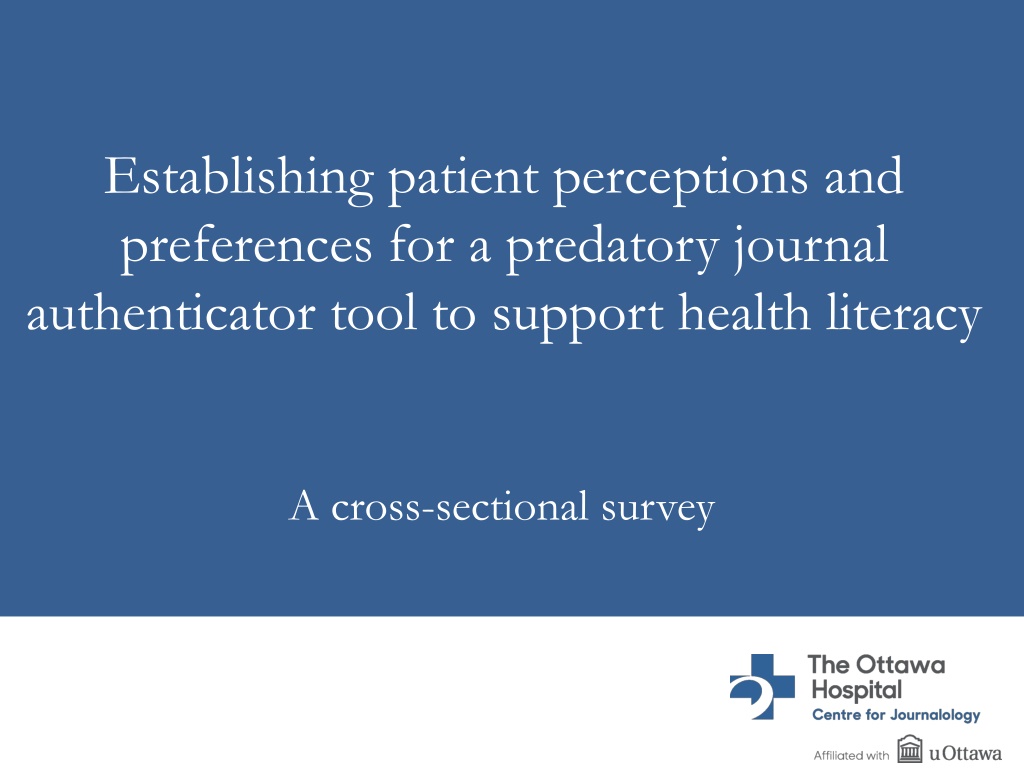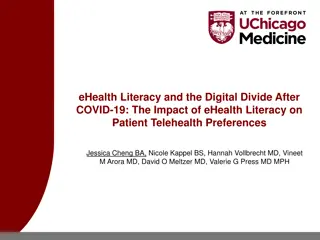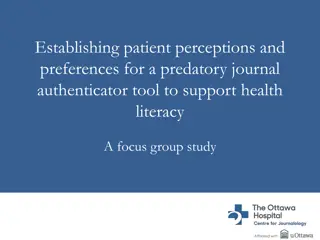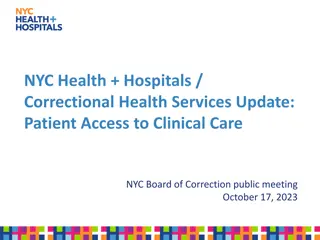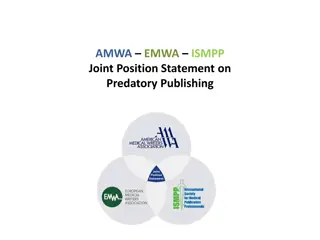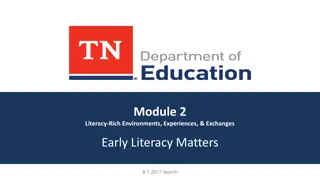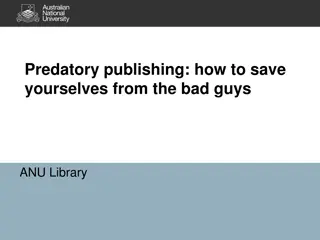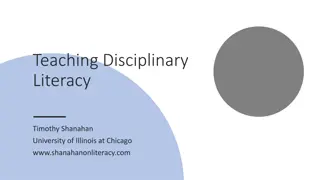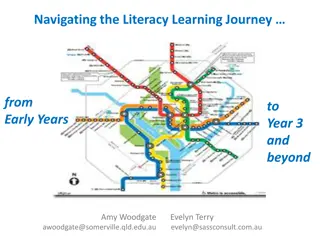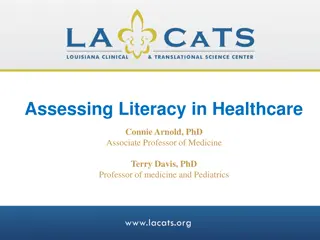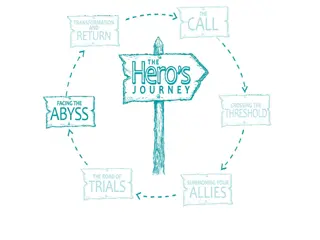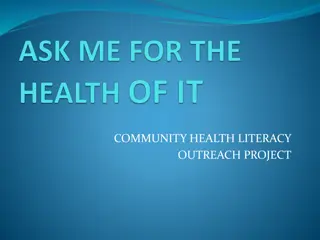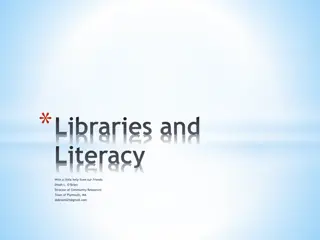Understanding Patient Perceptions of Predatory Journal Authenticator Tool in Health Literacy Support
This presentation focuses on patient perceptions and preferences regarding a predatory journal authenticator tool to enhance health literacy. It discusses the definition of predatory journals, the methodology used to develop the tool, obtained results, and future project steps, aiming to empower patients in discerning reputable sources for healthcare information.
Download Presentation

Please find below an Image/Link to download the presentation.
The content on the website is provided AS IS for your information and personal use only. It may not be sold, licensed, or shared on other websites without obtaining consent from the author. Download presentation by click this link. If you encounter any issues during the download, it is possible that the publisher has removed the file from their server.
E N D
Presentation Transcript
Establishing patient perceptions and preferences for a predatory journal authenticator tool to support health literacy A cross-sectional survey
Introduction In this presentation we provide: A description of our research on developing a digital journal authenticator tool Briefly discuss the methodology to develop the tool Provide results we have obtained so far concerning patient preferences State the next steps for this project
What is a predatory journal? Our team led a previous project to establish a community-based consensus definition of predatory journals. The definition established was: Predatory journals and publishers are entities that prioritize self-interest at the expense of scholarship and are characterized by false or misleading information, deviation from best editorial and publication practices, a lack of transparency, and/or the use of aggressive and indiscriminate solicitation practices. (Grudniewicz et al., 2019)
Background Predatory journals have traditionally been difficult to track and study because there was no consensus definition. The Centre for Journalology created a 3- part research program to define predatory journals. 1) Scoping Review: We aggregated all studies in literature and looked at characteristics of predatory journals described in the study 2) Delphi Survey: We took those characteristics and presented them to experts from diverse stakeholder groups like librarians, publishers, researchers and funders and in 3 rounds they voted on whether or not they thought those features were key features of predatory journals 3) Consensus Meeting: In April 2019, we brought together a diverse, international group of stakeholders in person and over two days, agreed on a statement on what a predatory journal is:
Beyond establishing a consensus definition of predatory journals, our expert panel discussed what the community needed to do to address predatory journals. It was agreed we needed to create: A journal authenticator tool A one stop shop (resource website) A digital tool to support users discerning the transparency practices of journals to help make decisions on whether to interact with the journal or not (i.e. read it, submit to it, or cite work published there) Including a database of research, media coverage, and policies and educational resources for different stakeholders.
Aim Here we describe our approach to developing the suggested Digital Journal Authenticator tool. The tool will highlight the quality of transparency practices and help users decide if they want to interact with the journal or not. The tool will be developed with a user-centered design in mind meaning we will incorporate the needs and preferences of the people who will use the tool.
Patient stakeholders Research publications affect how health care is delivered to patients. It is estimated that 70% of Canadians go online to search for health information1 often before visiting their doctors. If patients use the internet to obtain health information but cannot determine its quality, it could impact their care or change how they behave We want to help patients make sure they re not reading work shared in predatory journals. 1Canada S. Canadian Internet Use Survey.; 2011. www.statcan.gc.ca/daily-quotidien/100510/dq100510a-eng.htm
Methodology In this part of our research program we seek to obtain input from patients on the journal authenticator tool in two ways. In the first part of the study, we conducted a cross-sectional survey of patients to gauge how they use the internet to obtain health information.
Methodology We included all individuals who were 18 years or older, Canadian, and fluent in English. The survey was purpose-built using SurveyMonkey. We recruited people via Twitter, and two patient databases (The Ottawa Hospital s patient services team and Canada Health Infoway).
Our survey asked about The type of resources patients use when looking for health information How often and when patients look up this information How they determine if what they are reading online is true If they read academic research articles and are aware of predatory journals
Key findings 1) People turn to the internet when looking for health information We found that over 80% of patients use the internet as their main resource when looking for health information 3) People access original research articles when searching for health information About 25% of patients read research articles when looking for health information 4) Many people have difficulty knowing if the information they read online is reliable More than 52% of patients stated that they have difficulty knowing if the health information they re reading is reliable 2) Most people change their behavior after reading health information online Almost three quarters of patients have changed their behavior based on health information they ve read online
Survey results The next three slides display demographic details of our participants.
18-29 18% 60+ 56% 30-39 34% 40-49 34% 50-59 41%
Patient demographics and experience Demographics Identify as indigenous Yes N (%) N=180 11 (6) This information was collected as individual differences may impact how patients use the internet to obtain health information. Identify as person with disability Yes N=181 34 (19) Identify as a member of an ethnic minority Yes N=177 21 (12) Patient or caregiver Patient Caregiver Both N=168 80 (48) 48 (29) 51 (30) Experience as a researcher Yes N=183 52 (28) Worked professionally in health care Yes N=183 69 (38) Participant in health research project Yes N=183 89 (49) Experience as patient advisor or partner? Yes N=183 48 (26)
Survey results The following slides summarize the results from the digital health literacy portion of the survey
Resources most often used by patients when searching for health information 180 160 140 120 RESPONSES (N=178) 100 80 60 40 20 0 Academic articles Books Friends or family Health professionals Internet RESOURCES
How often patients use the internet to search for health information N=177 (%) Daily 23 (13) A few times a week 39 (22) A few times a month 59 (33) Every few months 30 (17) A few times a year 26 (15)
When do patients use the internet to look up health information? 160 140 120 100 80 RESPONSES (N=179) 60 40 20 0
Actions completed by participants after reading health information on the internet Has reading health information you obtained online ever led you to (N=179): Yes N(%) No N(%) Unsure N(%) Make an appointment with your health care provider 120 (68) 57 (32) - Make a change to your behaviours or lifestyle 127 (72) 50 (28) - Make a change to a medical treatment plan 60 (34) 115 (66) - Have you ever experienced a health problem or complication by making a change in behaviour/lifestyle/treatment plan as a result of reading health information online? 10 (6) 148 (83) 21 (12)
Resources patients use when searching for health information online 180 160 140 RESPONSES (N=179) 120 100 80 60 40 20 0 Google Wikipedia Health information website INTERNET RESOURCES Health charity or not-for-profit website Google Scholar
Navigating health information online How often do you read original research articles (i.e., publications produced by researchers in academic/scholarly journals) when searching for health information? N (%) N=179 Always 25 (14) Usually 44 (25) Sometimes 66 (37) Rarely 36 (20) Never 8 (5) If so, are they helpful? N=169 Always 12 (7) Usually 69 (41) Sometimes 78 (46) Rarely 9 (5) Never 1 (1)
Do you find it difficult to know if the health information you are reading online is based on reliable research evidence? N=177 Always 10 (5.7) Usually 32 (18.1) Sometimes 92 (52) Rarely 40 (22.6) Never 3 (1.7) Have you ever heard of a 'predatory journal'? N=176 Yes 78 (44.3) No 86 (48.9) Unsure 12 (6.8) How did you first learn about predatory journals? N=176 From this research project 91 (51.7) Other (please specify) 85 (48.3)
Thematic content analysis Why do this? To analyze our three text-based responses What is it? Thematic content analysis is a way to examine qualitative data. It identifies common themes topics, ideas, and patterns of meaning that occur repeatedly This was done by two independent coders. Answers were coded and refined when consensus was met by two coders. Then, patterns were identified among the codes to create general themes How was it done?
Survey results The following five slides display results from our three text-based questions that we analyzed through thematic content analysis. We display the themes we established for each question and the individual codes from responses
How do you determine whether the health information found on the Internet is accurate? Check the integrity of the piece Check for conflicts of interest Check for authorship Check for biases Check research methods Check the publication date Check references Check that work is peer- reviewed Validate the source
Check other sources of information Other Check with experts Other Cross check with other sources Don t check validity Check with health professionals Personal experience
Use trusted sources Use Use reliable sources Use hospital websites government sites Use Mayo Clinic Use nonprofit websites Use PubMed Use WebMD
Have you ever experienced a health problem or complication by making a change in your behaviour/lifestyle/treatment plan as a result of reading health information online? If yes, what type of health problem did you experience? - - - - - - - Increased uric acid levels Water retention in legs and developed hypoglycemia Cancer Liver disease Worsening of condition Increased mental health problems Reaction to suggested health aid
How did you first learn about predatory journals? Work and research experience Resources From other individuals Via my employment Media Friends From a health professional From research training experience Online Have received email invitations from predatory journals From a research expert
Conclusion Our survey results indicate that most patients turn to the Internet when they have health concerns and that more than half of patients sometimes have trouble discerning the trustworthiness of the health information they read online.
Part two The second part of this study will involve focus groups that will consolidate results from the survey and help us determine if patients would find a journal authenticator tool useful and if so, how to design a tool that would be relevant and useful to them.
Project team: Greg Bryson Kelly Cobey Agnes Grudniewicz Michael Halas Manoj Lalu David Moher Laurie Proulx Alicia Ricketts Thank you to all participants who responded to our survey. If you have any questions, please reach out to Dr. Kelly Cobey (kcobey@ohri.ca) or Dr. Manoj Lalu (mlalu@toh.ca)
